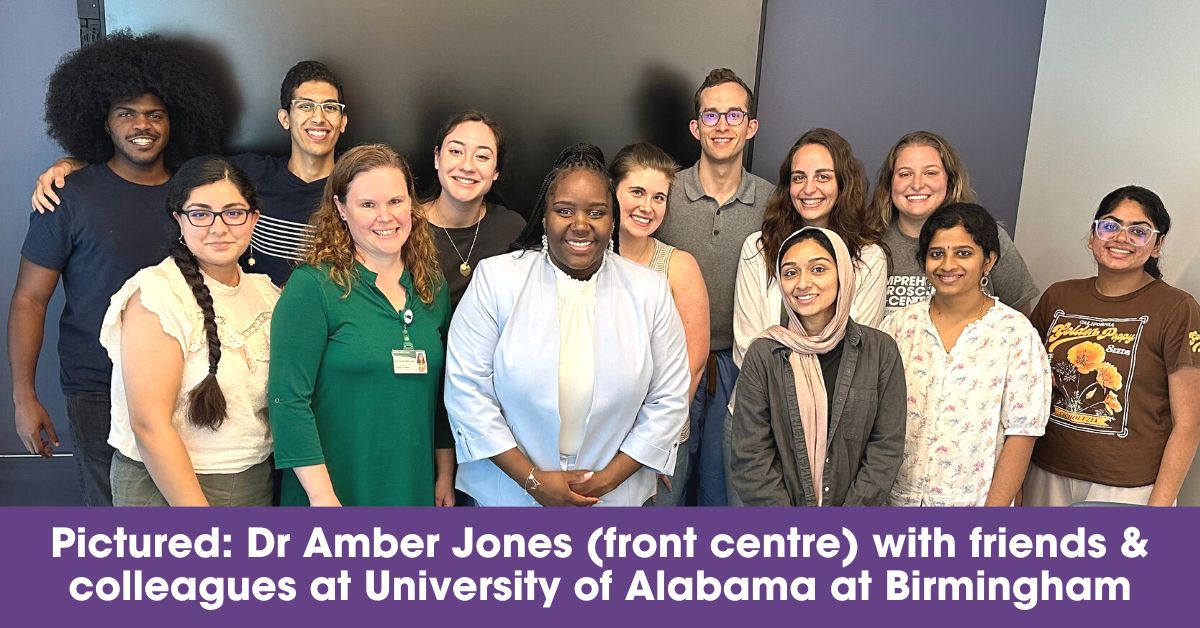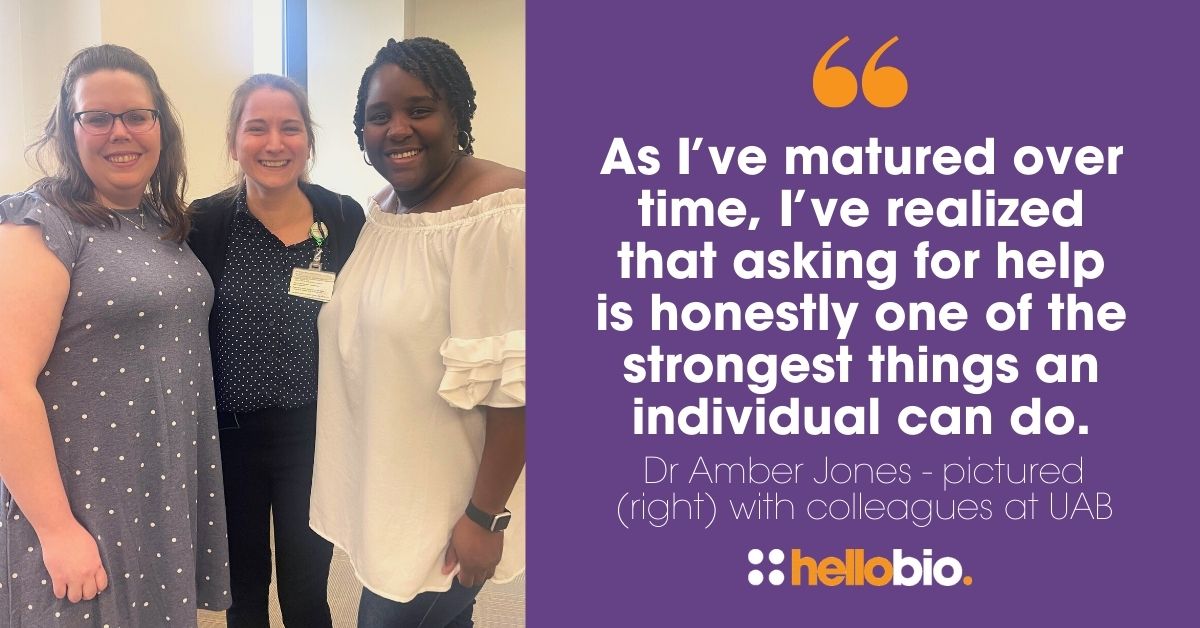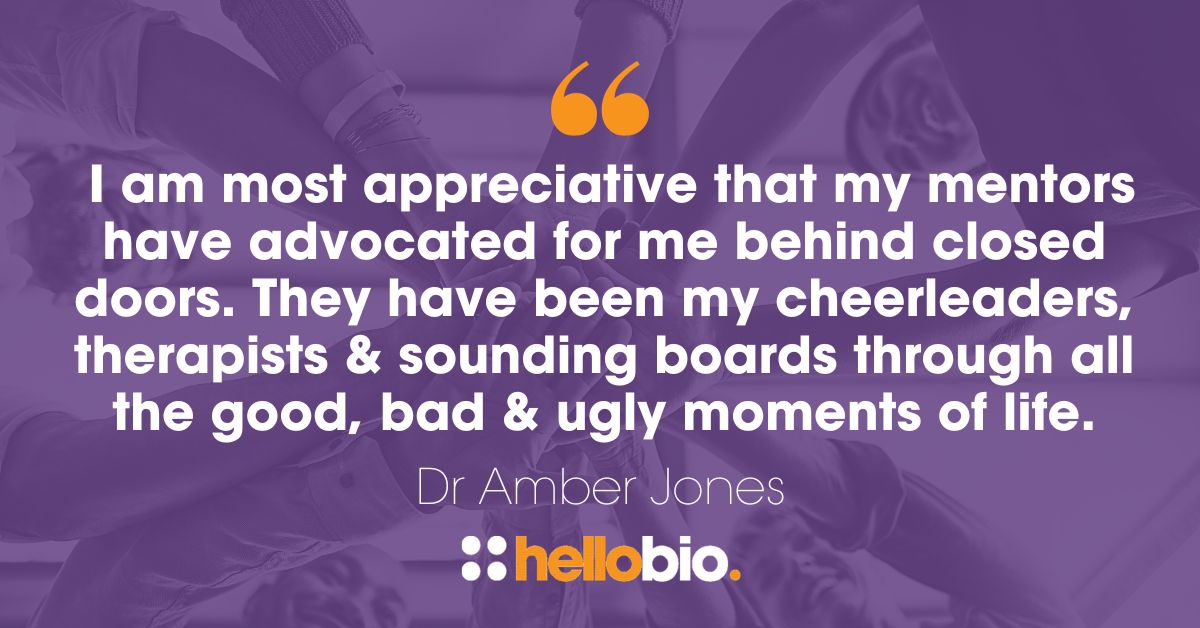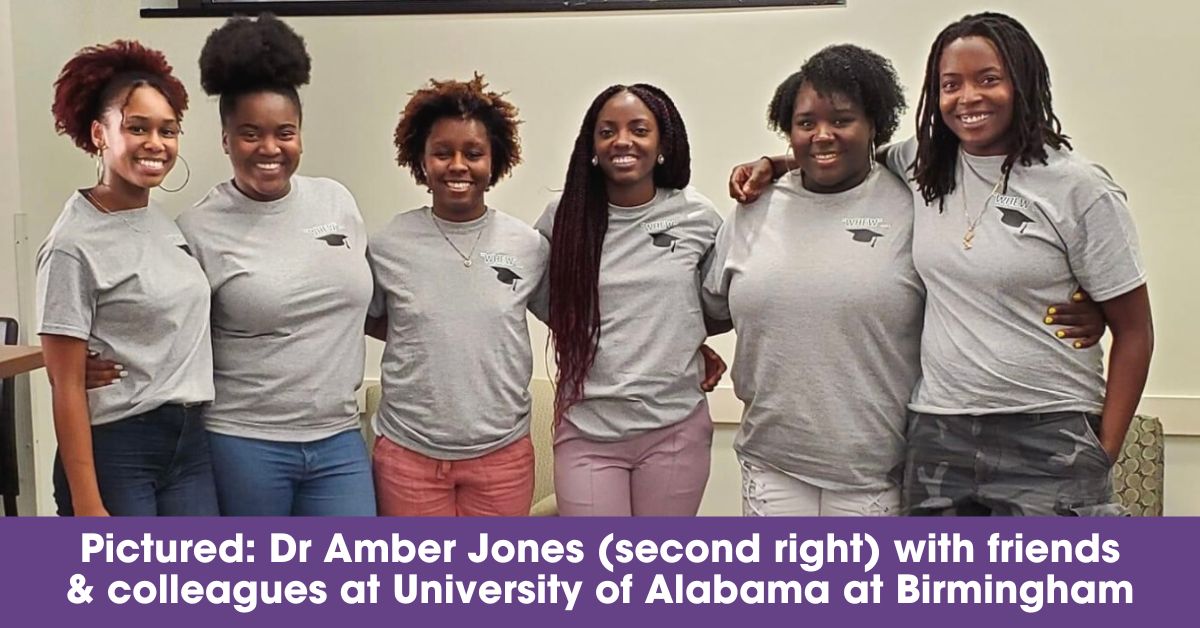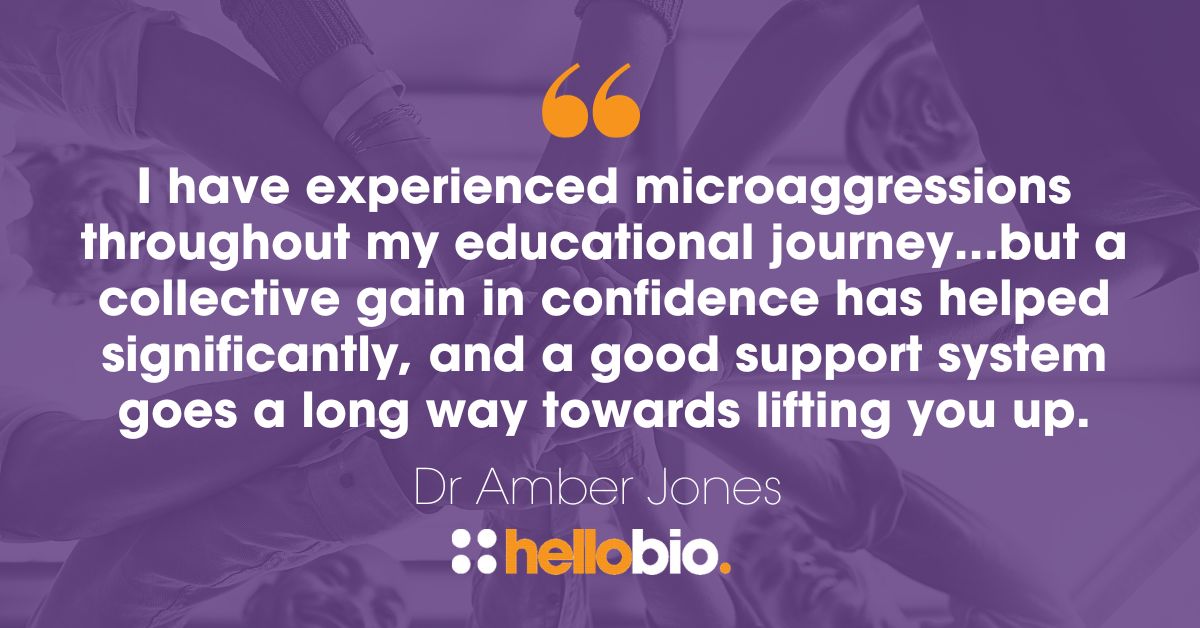The Importance of a Good Support System During Your PhD
Dr. Amber Breneé Jones, PhD, is a postdoctoral researcher at St. Jude Children’s Research Hospital in Memphis, Tennessee, USA. She recently completed her PhD at the University of Alabama at Birmingham, and expressed immense gratitude for the support she received along the way from collaborators, mentors, teachers, family and friends.
In this guest blog, she shares more about the support she’s received throughout her career, the value of meaningful mentoring, and the importance of a good support system when tackling the rigorous challenges of a PhD.
--------------
Starting out in STEM
Since a young age I knew that I was very interested in a biomedical career path. I wanted to make a clinically relevant impact, and it was not until college that I realized that, for me, that purpose was best fulfilled in the research setting. A successful career in STEM requires encouragement and support, and my family have always been the most supportive people in my life. My parents encouraged me to follow my dreams and have selflessly provided and sacrificed so much for me to be in this current position and career trajectory. They have always pushed me to excel and strive to be the best version of myself, in whatever career path I chose to take.
My academic path took me through high school to Hampton University, and eventually to the University of Alabama at Birmingham where I decided to embark on my PhD. My thesis work focused on enhancing novel therapeutic approaches for the adult brain tumor, glioblastoma (GBM) which has a terrible prognosis for affected patients. I had two distinct arms of my thesis project where one was focused on aiding gamma delta T-cell immunotherapy efforts by manipulating GBM cells stress responses. The other arm of my thesis work focused on identifying signaling mechanisms that mediated sensitivity to the newest treatment modality for GBM, known as Tumor Treating Fields which are the local administration of alternating electrical fields.
The unique challenges of a PhD
The challenges we face as science researchers are like no other. As a recovering control freak with major Type A personality, I think the unpredictability of science is my Achilles heel. To a fault, I like to know how everything will go and how or when to intervene if anything goes off course. Quickly in my PhD, I learned that those expectations were virtually impossible to achieve, and I had to learn how to loosen my reins and let the science dictate my path. This was much harder than it seemed and drove me to near tears some days but in hindsight, I thoroughly appreciate the unexpected journey my PhD training took me on as it led me to great discoveries, collaborators, and propelled me to a career path that I would have overlooked if it had been by my will alone.
I have not always been someone who immediately speaks out when they are struggling, but I have gotten better at asking for help over the years. I definitely have the “superwoman” complex and have sometimes viewed asking for help as a sign of weakness. However, as I have matured over time I’ve realized that asking for help is honestly one of the strongest things an individual can do. It displays humility and an eagerness to learn and get better at your craft which are just two components of success. Now, I always ask for help and support whenever I see fit.
Meaningful mentoring
The importance of good mentoring in STEM cannot be overstated. As cliché as it sounds, I would not be here today without the support of my mentors. Not only did they provide sound scientific and career advice, but they have also been instrumental in building my resiliency for this career. Science is one of the most mentally taxing careers that I know of, and I have felt defeated, incompetent, and unprepared more times than I would like to admit. The mentors that I have acquired have kept me afloat and motivated in my lowest points. They have made all the impossible feats seem possible and have stayed supportive in my most questionable of moments.
Personally, they have been my cheerleaders, therapists, and sounding boards when I’ve experienced all the good, bad, and ugly moments of life. They have practiced humanity when life gets difficult, and they are some of the people I go to first when I want to celebrate anything. Professionally, I am most appreciative of the fact that they have advocated for me in rooms behind closed doors. The opportunities and accolades provided to me on their recommendation is the highest form of praise and instilled a great deal of confidence and gratitude within me. Following a former mentor’s advice of “getting comfortable being uncomfortable” has allowed me to see the most growth within myself personally and professionally. Stepping out of my comfort zone at any level has helped immensely with confidence building and I am a mentally stronger woman by having done so. The things that 27-year-old Amber has accomplished are things that 15-year-old Amber would have never imagined, because I started embracing all of the uncomfortable yet transformative moments.
Mental health management
When times get tough and I need to manage my mental health, I’m a huge advocate of fully disconnecting from the source of the stress. To the best of my ability, I try to give myself breaks in the evenings where I can eat a nice meal, watch movies, etc. The 24/7 work mentality is not sustainable and only causes more stress and heartache. I fill my free time with things that are completely separate from whatever is causing me frustration. For me, these things include powerlifting, cooking, getting involved with my church, shopping, and spending quality time with my dog, Lola. I also really prioritize spending quality time with friends and family, and they have a great way of taking my mind off the stressful periods of my life.
I would like to see institutes and organizations prioritizing the mental health and wellbeing of their employees by performing more action items. In recent years, it feels almost performative when companies mention mental health, almost as if they know it is the active buzz word to recruit people. However, I think actions speak louder than words, and we need changes implemented that move past the discussion phase of mental health. I think organizations and institutions should be more genuine when it comes to aiding their employees with mental health solutions. They should offer tangible solutions that will aid in promoting a healthy work environment.
Support for minority groups in STEM
As a black woman in STEM, and probably any career for that matter, you really must be your strongest advocate and your own number one fan. So often in my field, I walk into rooms where no one looks like me, and that feeling of not belonging is one of the hardest that I have ever had to overcome. Despite having done 5 years of PhD training and having dutifully earned my degree, I still have feelings of doubt. We are always our toughest critics so I strongly advise just giving yourself grace and reiterating positive affirmations that you are doing your absolute best and understanding that despite the hurdles, your purpose will be fulfilled. Society is already doubting you so much and putting immense pressure on you to be without fault, so be kind to yourself and take steps to prioritize a healthy relationship within yourself first.
I have experienced my fair share of discrimination, particularly microaggressions, throughout the majority of my educational journey, which started as early as middle school. I have not found any one single remedy that helps you combat those negative feelings, but a collective gain in confidence over the years has helped significantly, and a good support system around you goes a long way towards lifting you up. With support from colleagues and friends, I started to truly love every aspect of myself (physically, mentally, emotionally, and spiritually) which helped dull out some of the ignorant people in my life. I would be lying if I said they don’t still annoy me when I experience them, but with the help of others I have learned to not give them power over me and they have yet to dictate my success.
Looking to the future
I’m excited to be embarking on my new role at St. Jude, serving as Postdoctoral Research Associate where my lab broadly focuses on enhancing CAR-T immunotherapy for clinical use against pediatric brain tumors. Moving forward, I hope that my career remains impactful in whatever fashion that needs to be. Ideally, I would still be in the translational research field conducting meaningful science to help eradicate diseases.
I’m very proud of my growth, not only as a scientist but also as an individual. I have pushed myself to new heights and made great strides in my career, and I am proud of who I see in the mirror daily, which is something I could not always say. I also hope that one of the pillars of my future career is focused on promoting STEM diversity initiatives and making space in the research community for marginalized communities. I plan on having both strong research and genuine outreach at the forefront of whatever career role I end up serving in.
I remain thankful for the support I have received over the years from so many different people, and I hope to pay that support forward by becoming a mentor and guide to others. Science research is a truly challenging career path, but by helping, and being helped by others, we can reach our goals.
--------------
More PhD resources for life scientists from Hello Bio
If you’re looking for more help, advice or support during your life science PhD, take a look at some of these excellent resources available now on the Hello Bio blog:
- The Life Scientists’ Guide for New PhD Students - advice from fellow scientists
- The Science PhD Survival Pack - a collection of PhD support resources
- Under Pressure: Breaking Free from the Stress of Your PhD - guest blog by Dr Noelia D. Falcon
- Taking Positive Steps Towards PhD Success - guest blog by Samuel Dada
- Maintaining PhD Productivity: Tips for Mindset and Organisation - guest blog by Britt Berning
- The Most Common PhD Problems & How to Get Past Them - guest blog by Lizzie Mann
- The Recipe for Sweet PhD Success - Part 1 - guest blog by Dr Noelia D. Falcon
- The Recipe for Sweet PhD Success - Part 2 - guest blog by Dr Noelia D. Falcon
_________________________________________________
If you enjoyed this article, why not check out the other resources available on our blog. We are passionate about supporting life scientists including early career life scientists and PhD students - with really low-priced reagents, antibodies and biochemicals, early career scientist grants, and resources to help with both personal and professional development. We know how tough it is - so we hope you find these helpful!
More General Support for Life Scientists
For advice on wellbeing, dissertations, presenting at conferences, wellbeing, PhD support, networking and lots more, we have a huge range of articles to help - just click below:
Save up to 50% on our high purity reagents...
When you get to the stage of planning your experiments, don't forget that we offer a range of low-cost, high-purity agonists, antagonists, inhibitors, activators, antibodies and fluorescent tools (yes - they really are around half the price of other suppliers!) You can use our Quick Multi-Search Tool to search for lots of products in one go, and the range includes:
- Enzyme inhibitors and activators
- Chemogenetic ligands
- Ion channel modulators
- GPCR & ionotropic receptor ligands
- Cell biology reagents & biochemicals
Technical resources
Try our Molarity Calculator: a quick and easy way to calculate the mass, volume or concentration required for making a solution.
Try our Dilution Calculator: an easy way to work out how to dilute stock solutions of known concentrations
We also offer a comprehensive range of technical resources including antibody protocols and methods, product guides and mini-reviews:
And finally, don't forget to check back in with our blog regularly for our latest articles. If there’s something you’d love to contribute to the community, whether that’s an interview or article, drop us a line at hello@hellobio.com






